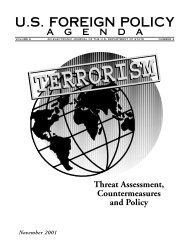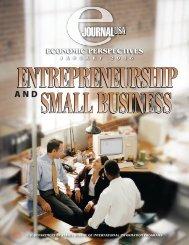s. history us history us history - Embassy of the United States
s. history us history us history - Embassy of the United States
s. history us history us history - Embassy of the United States
- No tags were found...
You also want an ePaper? Increase the reach of your titles
YUMPU automatically turns print PDFs into web optimized ePapers that Google loves.
CHAPTER 5: WESTWARD EXPANSION AND REGIONAL DIFFERENCESTHE FRONTIER, “THE WEST,” ANDTHE AMERICAN EXPERIENCEThe frontier — <strong>the</strong> point at which settled territory met unoccupied land— began at Jamestown and Plymouth Rock. It moved in a westward directionfor nearly 300 years through densely forested wilderness and barren plainsuntil <strong>the</strong> decennial cens<strong>us</strong> <strong>of</strong> 1890 revealed that at last <strong>the</strong> <strong>United</strong> <strong>States</strong> nolonger possessed a discernible line <strong>of</strong> settlement.At <strong>the</strong> time it seemed to many that a long period had come to an end— one in which <strong>the</strong> country had grown from a few struggling outposts <strong>of</strong>English civilization to a huge independent nation with an identity <strong>of</strong> its own.It was easy to believe that <strong>the</strong> experience <strong>of</strong> settlement and post-settlementdevelopment, constantly repeated as a people conquered a continent, had been<strong>the</strong> defining factor in <strong>the</strong> nation’s development.In 1893, <strong>the</strong> historian Frederick Jackson Turner, expressing a widely heldsentiment, declared that <strong>the</strong> frontier had made <strong>the</strong> <strong>United</strong> <strong>States</strong> more than anextension <strong>of</strong> Europe. It had created a nation with a culture that was perhapscoarser than Europe’s, but also more pragmatic, energetic, individualistic, anddemocratic. The existence <strong>of</strong> large areas <strong>of</strong> “free land” had created a nation <strong>of</strong>property holders and had provided a “safety valve” for discontent in cities andmore settled areas. His analysis implied that an America without a frontierwould trend omino<strong>us</strong>ly toward what were seen as <strong>the</strong> European ills <strong>of</strong> stratifiedsocial systems, class conflict, and diminished opportunity.After more than a hundred years scholars still debate <strong>the</strong> significance <strong>of</strong><strong>the</strong> frontier in American <strong>history</strong>. Few believe it was quite as all-important asTurner suggested; its absence does not appear to have led to dire consequences.Some have gone far<strong>the</strong>r, rejecting <strong>the</strong> Turner argument as a romantic glorification<strong>of</strong> a bloody, brutal process — marked by a war <strong>of</strong> conquest againstMexico, near-genocidal treatment <strong>of</strong> Native American tribes, and environmentaldespoliation. The common experience <strong>of</strong> <strong>the</strong> frontier, <strong>the</strong>y argue, was one<strong>of</strong> hardship and failure.Yet it remains hard to believe that three centuries <strong>of</strong> westward movementhad no impact on <strong>the</strong> national character and suggestive that intelligent foreignobservers, such as <strong>the</strong> French intellectual, Alexis de Tocqueville, were fascinatedby <strong>the</strong> American West. Indeed, <strong>the</strong> last area <strong>of</strong> frontier settlement, <strong>the</strong>vast area stretching north from Texas to <strong>the</strong> Canadian border, which Americanstoday commonly call “<strong>the</strong> West,” still seems characterized by ideals <strong>of</strong>individualism, democracy, and opportunity that are more palpable than in <strong>the</strong>rest <strong>of</strong> <strong>the</strong> nation. It is perhaps also revealing that many people in o<strong>the</strong>r lands,when hearing <strong>the</strong> word “American,” so <strong>of</strong>ten identify it with a symbol <strong>of</strong> thatfinal frontier — <strong>the</strong> “cowboy.”OUTLINE OF U.S. HISTORY<strong>United</strong> <strong>States</strong> <strong>of</strong> America, showing territorial expansion from 1803 to 1898.126127












